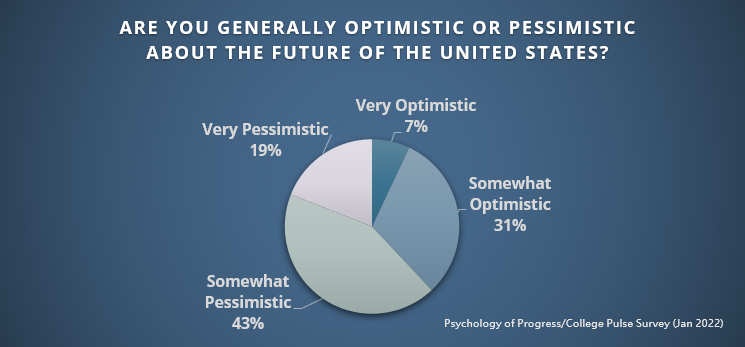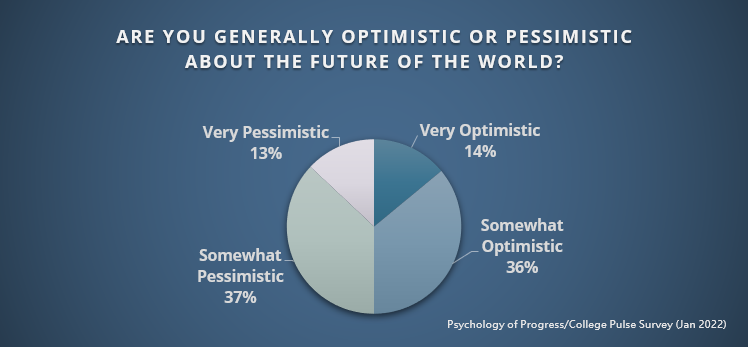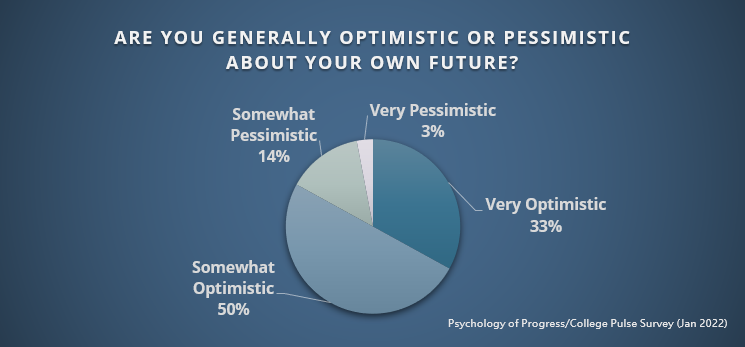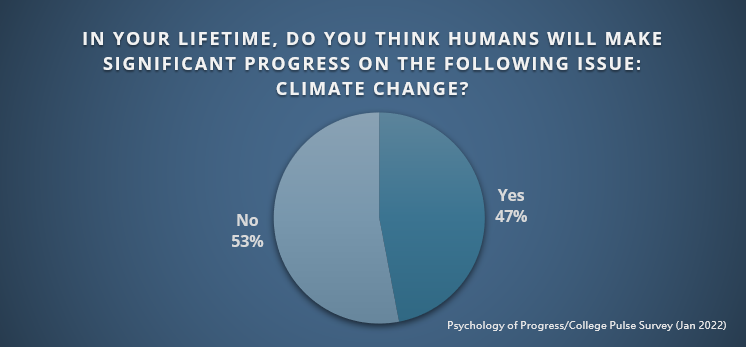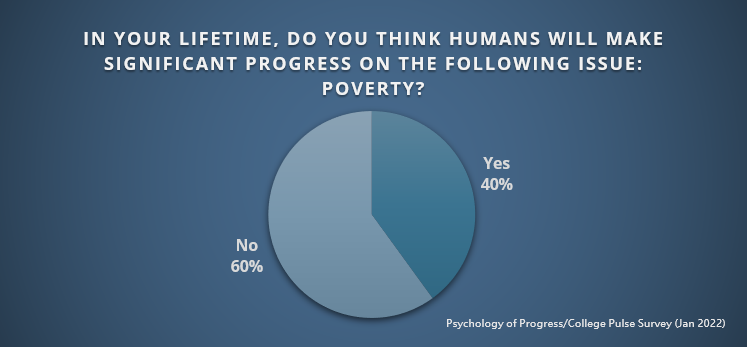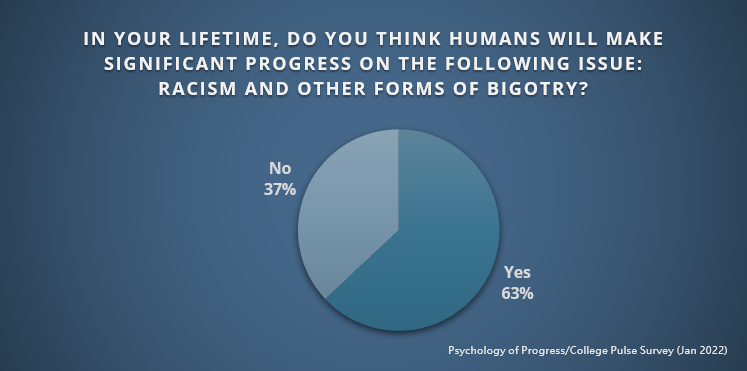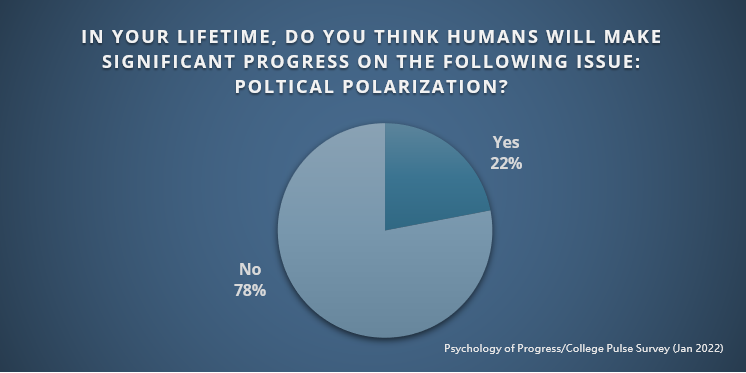Thinking About the Future: Are College Seniors Optimistic?
Introduction
At Psychology of Progress, we asked college seniors about their views on the future. In collaboration with College Pulse, we conducted a nationally representative survey with a sample of 500 college seniors. We focused on college seniors because they are about to complete a major educational goal and most of them will shortly be joining the professional workforce, pursuing advanced professional training, or launching their own businesses. These individuals play an important role in building the future of our society and advancing the cause of human progress.
Are graduating college students optimistic about the future of the United States, the future of the world, and their own future? Do they believe humans will make significant progress on big issues in their lifetime? Here is what we learned.
Optimism About the Future of the United States
College seniors are generally pessimistic about the future of the United States. Only 38 percent of students are very or somewhat optimistic. Sixty-two percent are very or somewhat pessimistic. College seniors are far more likely to be very pessimistic than they are to be very optimistic about the future of the United States.
Optimism About the Future of the World
College seniors are evenly divided in their views about the future of the world. Fifty percent of students are very or somewhat optimistic. Fifty percent are very or somewhat pessimistic.
Optimism About One's Own Future
College seniors are generally optimistic about their own futures. Eighty-three percent of students are very or somewhat optimistic, and 17 percent are very or somewhat pessimistic. However, only one-third of college seniors are very optimistic about their future.
Progress Beliefs
In addition to examining optimism and pessimism at a broad level, we wanted to learn what college seniors think about the future of progress on specific societal issues. We asked college seniors if they think humans will make significant progress in their lifetime on climate change, poverty, racism and other forms of bigotry, and political polarization.
Climate Change
On the issue of climate change, college seniors are almost evenly divided, but a slight majority have a pessimistic view about the future. Forty-seven percent think that humans will make significant progress, and 53 percent think that humans will not make significant progress on this issue within their lifetime.
Poverty
On the issue of poverty, the majority of college seniors are pessimistic about progress. Forty percent think that humans will make significant progress, and 60 percent think that humans will not make significant progress on this issue within their lifetime.
Racism and Other Forms of Bigotry
College seniors are more optimistic about progress on the issue of racism and other forms of bigotry. Sixty-three percent think that humans will make significant progress, and 37 percent think that humans will not make significant progress on this issue within their lifetime.
Political Polarization
College seniors are the most pessimistic about the issue of political polarization. Twenty-two percent think that humans will make significant progress, and 78 percent think that humans will not make significant progress on this issue within their lifetime.
Conclusion
Our survey offers a snapshot of what U.S. college seniors think about the future. College seniors are more optimistic about their own future than they are about the future of the United States and the world.
As far as attitudes about specific issues relevant to human progress, college seniors are generally pessimistic. The majority do not think that in their lifetime humans will make significant progress on climate change, poverty, or political polarization. However, college students are more optimistic about progress on racism and other forms of bigotry; more than 60 percent think humans will make significant progress on this issue.
The survey suggests that college seniors are most pessimistic about the political health of America. Over 60 percent are pessimistic about the future of the United States and 80 percent do not think that in their lifetime there will be significant progress made on the problem of political polarization.
About the Survey
Interviews were conducted in English among a sample of 500 undergraduate students who are currently enrolled in a college or university in the U.S. The sample was drawn from College Pulse’s Undergraduate Student Panel that includes over 400,000 verified students representing more than 1000 different colleges and universities in all 50 states. Panel members are recruited by a number of methods to help ensure diversity in the panel population, including web advertising, permission-based email campaigns, and partnerships with university organizations.
To reduce the effects of any non-response bias, a post-stratification adjustment was applied based on demographic distributions from the 2017 Current Population Survey (CPS). The post-stratification weight rebalanced the sample based on the following benchmarks: age, race and ethnicity, and gender. The sample weighting was accomplished using an iterative proportional fitting (IFP) process that simultaneously balances the distributions of all variables. Weights were trimmed to prevent individual interviews from having too much influence on the final results.
The margin of error for this survey is +/- 5%. Margins of error are typically calculated on probability-based samples and are not technically correct for non-probability online samples. We supply them here to provide a general assessment of error ranges that may be associated with the data. This survey was fielded from January 21-26, 2022.
About the Author
Clay Routledge, Director of Psychology of Progress
Arden & Donna Hetland Distinguished Professor of Business and Scholar of the Sheila and Robert Challey Institute for Global Innovation and Growth at North Dakota State University
Author Bio clay.routledge@ndsu.edu
Psychology of Progress
Psychology of Progress is a project of the Challey Institute at North Dakota State University with support from the Archbridge Institute and Institute for Humane Studies. In order to sustain and accelerate human progress, it is important to understand the psychology of progress. Our goal is to help individuals and organizations understand and apply psychological science to promote progress and flourishing.



 Download PDF
Download PDF